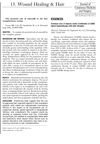 April 2024 in “JMIR infodemiology”
April 2024 in “JMIR infodemiology” TikTok videos show that people with Lupus often discuss symptoms and their significant impact on mental health, face diagnostic delays, have mixed views on treatments, and feel isolated despite support.

Lupus patients on TikTok feel isolated, face medical gaslighting, and prefer non-drug treatments.
 May 2004 in “Facial Plastic Surgery Clinics of North America”
May 2004 in “Facial Plastic Surgery Clinics of North America” Better understanding of hair patterns and advanced techniques are crucial for improving hair restoration and removal outcomes.
 37 citations,
February 2007 in “Clinical Obstetrics and Gynecology”
37 citations,
February 2007 in “Clinical Obstetrics and Gynecology” The document concludes that treating PCOS requires a combination of drugs to manage reproductive and metabolic symptoms, with more research needed on combination therapies.
 49 citations,
July 2004 in “Anesthesiology”
49 citations,
July 2004 in “Anesthesiology” The document concludes that more research is needed to understand how to treat muscle pain with drugs.
 49 citations,
March 2014 in “Dermatologic clinics”
49 citations,
March 2014 in “Dermatologic clinics” These skin conditions in African men need combined medical treatments and lifestyle changes.
 8 citations,
August 2021 in “Fertility and Sterility”
8 citations,
August 2021 in “Fertility and Sterility” Treatments for enlarged prostate can cause problems with ejaculation, and less invasive options might preserve sexual function better.
 151 citations,
May 2014 in “American Journal of Clinical Dermatology”
151 citations,
May 2014 in “American Journal of Clinical Dermatology” Effective treatments for male pattern baldness include oral finasteride and topical minoxidil, while topical minoxidil is best for female pattern baldness.
 2 citations,
October 2021 in “Indian Journal of Plastic Surgery”
2 citations,
October 2021 in “Indian Journal of Plastic Surgery” The best treatments for slowing down pattern hair loss are minoxidil and finasteride, with some other drugs and hair transplantation also used.
20 citations,
September 2015 in “Pediatric Annals” PCOS in teen girls should be managed with lifestyle changes and sometimes medication to improve symptoms and health.
 53 citations,
February 2020 in “Expert Opinion on Pharmacotherapy”
53 citations,
February 2020 in “Expert Opinion on Pharmacotherapy” Finasteride and minoxidil work best together for hair loss.
 25 citations,
October 2012 in “Dermatologic clinics”
25 citations,
October 2012 in “Dermatologic clinics” Laser and light treatments can effectively remove hair long-term.
 May 2004 in “Pediatric Dermatology”
May 2004 in “Pediatric Dermatology” Atopic dermatitis may have genetic causes and can be treated with pharmacologic methods, glycerin creams, and controlling Staphylococcus aureus colonization.
 July 2003 in “Journal of Cutaneous Medicine and Surgery”
July 2003 in “Journal of Cutaneous Medicine and Surgery” Minoxidil may improve hair transplants and combining treatments could help alopecia areata.
17 citations,
August 2018 in “Clinics in Dermatology” Skin and hair-picking disorders are common and need both skin and mental health treatments.
 April 2013 in “Cancer Research”
April 2013 in “Cancer Research” A botanical extract was found to be a safe treatment that may prevent hair loss in chemotherapy patients.
 October 2014 in “Cancer Research”
October 2014 in “Cancer Research” A new topical treatment may prevent hair loss from cancer therapy by adjusting cell death processes in hair follicles.
 77 citations,
July 2020 in “European Journal of Clinical Pharmacology”
77 citations,
July 2020 in “European Journal of Clinical Pharmacology” Blocking the virus's entry into cells by targeting certain pathways could lead to early COVID-19 treatments.
 November 2021 in “Elsevier eBooks”
November 2021 in “Elsevier eBooks” Antiandrogens are used to manage polycystic ovary syndrome by reducing androgen levels or controlling their effects, often combined with lifestyle changes and other treatments.
 31 citations,
October 2002 in “Dermatologic Surgery”
31 citations,
October 2002 in “Dermatologic Surgery” Minoxidil helps stabilize hair loss, increase density, and reduce shedding after hair transplant surgery.
 34 citations,
January 2018 in “International Journal of Dermatology”
34 citations,
January 2018 in “International Journal of Dermatology” Scalp cooling is the most effective FDA-approved method to prevent chemotherapy-induced hair loss, but more research is needed for other treatments.
3 citations,
August 2022 in “International Journal of Molecular Sciences” COVID-19 can cause hair loss, and treatments like PRP and stem cells might help.
October 2024 in “Our Dermatology Online” Mitochondrial dysfunction links metabolic syndrome and inflammatory skin diseases, suggesting targeted therapies and lifestyle changes.
 March 2024 in “International journal of pharmaceutical sciences and drug research”
March 2024 in “International journal of pharmaceutical sciences and drug research” Androgenetic alopecia is influenced by various factors and can be treated with medications, procedures, and non-drug methods.
 September 2022 in “Women's healthcare”
September 2022 in “Women's healthcare” PCOS is managed by lifestyle changes and personalized medication to improve symptoms and fertility.
 15 citations,
June 1995 in “The American Journal of the Medical Sciences”
15 citations,
June 1995 in “The American Journal of the Medical Sciences” Finasteride caused enlarged breast tissue in a 62-year-old man.
 September 2024 in “Advanced Biomedical Research”
September 2024 in “Advanced Biomedical Research” Auriculotherapy and Aslagh capsules are as effective as metformin for treating PCOS symptoms, with auriculotherapy slightly better for reducing hair growth.
 24 citations,
July 2016 in “Revue Neurologique”
24 citations,
July 2016 in “Revue Neurologique” Gilles de la Tourette syndrome is treatable, with behavioral therapy as a recommended first option and other treatments available for more severe cases.
 November 2024 in “Frontiers in Medicine”
November 2024 in “Frontiers in Medicine” Cirrhosis affects quality of life with various symptoms, requiring a holistic, multidisciplinary approach for management.
 June 2023 in “JAAD case reports”
June 2023 in “JAAD case reports” The document concludes that "hot comb alopecia" is now called "central cicatricial centrifugal alopecia" and its causes are complex.

























